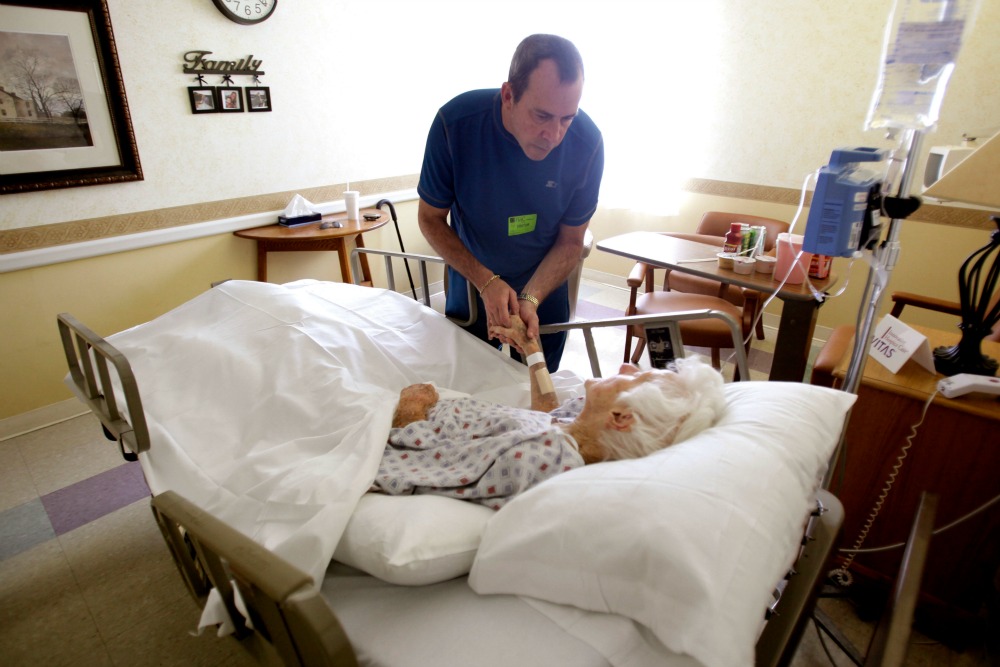
 In his 2010 New Yorker essay “Letting Go,” surgeon Atul Gawande stops by the intensive care unit at his hospital and describes the sad state of its patients at the very end of their lives. While two out of 10 patients there are likely to make it out of the hospital, the others, he says, are more like an 80-year-old woman with irreversible congestive heart failure, “who was in the ICU for the second time in three weeks, drugged to oblivion and tubed in most natural orifices and a few artificial ones.” There’s a 70-year-old on a ventilator who chose to forgo treatment in the final stages of cancer, but whose doctor convinced her to change her mind. There’s a woman who didn’t want to die in a hospital, but whose children insisted she fight for life.
In his 2010 New Yorker essay “Letting Go,” surgeon Atul Gawande stops by the intensive care unit at his hospital and describes the sad state of its patients at the very end of their lives. While two out of 10 patients there are likely to make it out of the hospital, the others, he says, are more like an 80-year-old woman with irreversible congestive heart failure, “who was in the ICU for the second time in three weeks, drugged to oblivion and tubed in most natural orifices and a few artificial ones.” There’s a 70-year-old on a ventilator who chose to forgo treatment in the final stages of cancer, but whose doctor convinced her to change her mind. There’s a woman who didn’t want to die in a hospital, but whose children insisted she fight for life.
This is a scene that could play out only in our present age of medicine. Advances in medical care have allowed us to extend life beyond what was previously possible. But what life becomes in these cases isn’t always pretty: The price for a few more days or months may be intense suffering. “In the past few decades, medical science has rendered obsolete centuries of experience, tradition, and language about our mortality,” Gawande writes. The result, he says, is “a new difficulty for mankind: how to die.”
Who decides how to die? When is it right to stave off death with all the technology available, and when is it right to accept the end—through hospice care, which focuses on making the end of life as comfortable as possible, or even, at a controversial extreme, through physician-assisted suicide? In advance of a January 20 Zócalo/UCLA event, “Does Medicine Know How to Approach Death?”, we asked end-of-life experts: What can medicine do to better cope with the ethical challenges of modern end-of-life care?

Despite our high-tech health care, the ethical challenges of modern end-of-life care look much the same as those at the dawn of Western medicine.
Hippocrates counseled that treatment should cease when patients are “overmastered by disease” so nature might take its course, yet patients are often overtreated. The Hippocratic Oath specifically prohibits physician-assisted suicide (PAS) and euthanasia (practices common in Hippocrates’ time), yet today, some see PAS as an “end-of-life option.”
Why can’t we get care of the dying right?
Americans are fighters. But knowing when not to fight death is important. To “do everything” is unhealthy at life’s end. At the other end of the spectrum, PAS and euthanasia are not answers either.
What we should fight for is good hospice and palliative care based on patient preferences, care that physicians want—and have an ethical duty—to provide. Hospice care is a form of palliative care for dying patients. Palliative care improves quality of life for seriously ill patients (and families) by treating physical and psychological symptoms, providing spiritual support, and coordinating care. It emphasizes advance care planning to respect patients’ treatment goals and preferences if they later can’t speak for themselves. It embraces vigorous pain control for dying patients, even if a side effect is to hasten death (very different from PAS and euthanasia).
A recent survey found 90 percent of adults did not know what palliative care is, but when told its definition, more than 90 percent said they would want it.
Providing excellent hospice care helps fulfill the physician’s duty to act in the patient’s best interest and provide comfort, always, even when cure is not possible. Starting in 2016, changes in Medicare policy will finally encourage advance care planning discussions and earlier hospice care for those near life’s end.
It’s about time.
Lois Snyder Sulmasy is the director of the Center for Ethics and Professionalism at the American College of Physicians.

Modern medicine is full of technical marvels when it comes to diagnostic tools and innovative therapies, yet we understand these wonderful interventions can never keep someone from dying eventually. The intense pressure to sort through diagnostic information to apply the latest medication frequently skips one of medicine’s most important steps: considering the patient’s goals.
When clinicians elicit patient goals, we better understand what the patient values. When clinicians understand what is important to the patient, ultimately we craft a better plan. Goals drive the plan.
Yet what about the patient whose goal is to cure an incurable disease? It can be easy to confuse goals with wishes. Wishes reflect the longest odds, so treatment can’t be based on them, even though they carry people through some of life’s darkest challenges. In contrast, goals focus on what we expect medicine can achieve.
To clarify our expectations of medicine, clinicians should openly discuss prognosis, with all of the inherent uncertainty that comes with predicting the future. Doctors who talk with patients about likely outcomes have patients with more realistic predictions about their survival.
Only when goals and expected outcomes are discussed can patients truly choose a treatment plan that reflects their values. And when the goals are beyond what medicine can achieve, clinicians can begin honest discussions to make sure the time left, no matter how short it may be, is unencumbered by suffering.
When clinicians reach an ethical challenge, we should ask ourselves: What are the patient’s goals?
Christian Sinclair is a palliative care physician at the University of Kansas Hospital and the editor of Pallimed, a website focusing on palliative care news and research.

Too often, Americans end up dying in the hospital when they would prefer to spend their last days at home. Tragically, stories persist of doctors who aren’t forthcoming about terminal prognoses, avoid discussing hospice, and disregard advance directives—the legal documents that detail patients’ end-of-life decisions. In the worst cases, people whose quality-of-life priorities are ignored suffer traumatic and painful deaths.
In 2010, the PBS show “Frontline” aired a documentary called “Facing Death” about the bone-marrow transplant unit at Manhattan’s Mount Sinai Hospital. It portrays chilling examples of physicians following an imperative to attack disease, regardless of associated suffering and an often-miniscule likelihood of success. The aggressive treatments are life-threatening in themselves, yet suffering is accepted as necessary collateral damage in medicine’s larger war on cancer.
Subsequently, New York enacted a law to help prevent this end-of-life mistreatment: the Palliative Care Information Act. It’s simple, short, and outlines a specific standard to inform people approaching the end of life. When a disease has advanced to the terminal phase and a person is unlikely to survive six months, doctors must offer to reveal this information and advise the person of all available treatments, including those aiming to bring comfort, not cure disease.
Patients deserve full disclosure when disease is beyond reasonable hope of cure, and, without aggressive palliative measures, symptoms may escalate to the point of intolerance. They have a right to know when disease-specific treatments offer only a minute chance to prolong their lives for a few weeks or months. And they have a right to know palliative therapies could make them feel a lot better for the time they have left.
Other states should pass laws similar to PCIA and empower people to die as gently as possible.
Barbara Coombs Lee is an attorney who was an ER and ICU nurse and physician assistant for 25 years. She is president of Compassion & Choices.

Thanks to miraculous advances in medicine, millions of people today are living with diseases, such as diabetes and kidney or heart failure, that have been rapidly fatal in previous eras of human history. Ironically, as science has given us ever-more-effective disease treatments, it has gotten harder to deliver on our most basic societal and professional obligations to incurably ill people. In the quest to save and extend life, we have inadvertently made it harder to die.
Because life is precious, there will be natural tensions between striving to preserve a person’s life and trying to avoid needless suffering. These can be wrenching, deeply personal decisions. What’s right for one patient can be wrong for another.
The ethics are clear: Authority for making these choices ultimately lies with patients themselves, or the individuals patients choose to speak on their behalf. Seriously ill people deserve help in assessing their options. Clinicians can assist them in clarifying their values and bring their priorities to bear as they weigh the potential benefits of treatments against the attendant burdens and risks of those treatments.
In leading health care systems today, palliative care teams work alongside disease-treating colleagues to expertly alleviate symptoms and to anticipate and prevent crises. Palliative care must become reliably available in every setting in which people with serious illness receive care.
At the very least, as the end of someone’s life approaches, we can ease their pain, honor their dignity, and support their family.
Ira Byock is chief medical officer of the Institute for Human Caring of Providence Health and Services in Torrance, California. His books include Dying Well and The Best Care Possible.

Medicine has always been in the business of hope—hope for better health, for cure from life-threatening disease, for more time in the face of terminal illness. Hope is a profoundly spiritual concept, religious for some and metaphysical for others, and a reflection of who we are and what we value. But unlike care in the bygone days of Asclepius, modern Western medicine almost solely focuses on the physical, the corporeal, and the palpable. What is seen and touched is “real,” and the desires of the heart and soul are sidelined in the pursuit of measurable medical outcomes.
Perhaps the ethical challenges around end-of-life care would be less distressing if we embraced the spiritual rather than distancing ourselves from it in our consults, assessments, and protocols. After all, most people who seek medical treatment hope for something in addition to relief from physical symptoms. “I just want to enjoy my life again,” is often heard in the exam room, or “If I could only feel more like myself…”
Conversations about hope will not solve all ethical quandaries for either patients or providers. However, discussions between medical caregivers, care recipients, and their families about their hope(s) and what gives their life meaning may set the stage for smoother transitions from curative to palliative treatment at the end of life.
Rhonda S. Cooper is the chaplain for the Johns Hopkins Sidney Kimmel Comprehensive Cancer Center, in Baltimore, Maryland.



